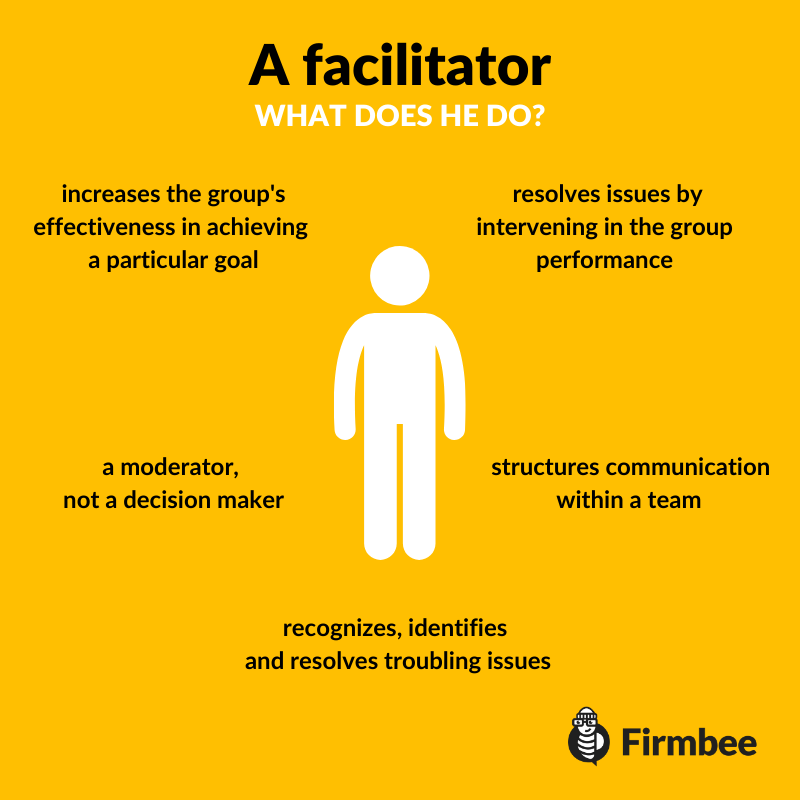Both employers and their employees want teamwork to be efficient, effective, and friendly. Everyone expects that the effect of cooperation will satisfy the group and each of its participants. This article will define the basis of facilitation for effective teamwork and its contribution to the working environment.
Facilitation – table of contents:
- Facilitation for effective teamwork – why it’s so important?
- What is facilitation?
- Who is a facilitator?
- Benefits of facilitation
- Obstacles to effective facilitation
Facilitation for effective teamwork – why it’s so important?
Facilitation becomes an essential part of managing projects because it strengthens work organization, improves the atmosphere between co-workers and enables the group to set and meet its goals more easily. It also tones down conflicts that often occur during the project. The whole process is supervised by an outsourced experienced facilitator.
What is facilitation?
Facilitation is a process designed for a group to define and achieve a particular goal. It is used to improve cooperation within the group and maximize its effectiveness.
Every member of the team is encouraged to speak up and act in order for a group and its members to fulfill their potential. Facilitation becomes an essential part of managing projects because it strengthens work organization, improves the atmosphere between co-workers and enables the group to set and meet its goals more easily. It also tones down conflicts that often occur during the project. The whole process is supervised by an outsourced experienced facilitator.
Who is a facilitator?

The facilitator is neutral and does not hold the authority to make decisions concerning the merits of collaboration. When it comes to facilitation for effective teamwork, his or her task is to increase the group’s capability to achieve a particular goal. Being a moderator of a discussion, the facilitator resolves issues by intervening in the group performance.
The presence of a facilitator in a group sharpens its abilities to recognize, identify and resolve troubling issues by setting out and taking definite measures. The role of a facilitator is also to structure communication within a team in such a way that its members reach an agreement and develop an insight into its premises.
Benefits of facilitation
The list of gains from using facilitation in the project management field is quite extensive.
The most important benefits of facilitation for effective teamwork are:
- boosting group creativity,
- harnessing each team member’s potential,
- clarifying the objective
- structuring cooperation,
- fostering relations in the group,
- providing greater openness to and acceptance of other participants’ ideas,
- developing proactive attitude of all participants,
- working out interesting methods of problem-solving,
- enabling greater compromise in the group.
Obstacles to effective facilitation
Despite the positive impact of facilitation for effective teamwork, there is no guarantee that it will always render the desired results.
Here are some obstacles which can occur when this process is implemented:
- it is time-consuming,
- it can lack success when the bar is raised above the skills of the group,
- organizational costs rise when working with a facilitator,
- low effectiveness may occur due to insufficient neutrality of the facilitator when hiring an internal facilitator,
- any lack of trust in the group can reduce the effectiveness of the process,
- incompetent facilitation and lack of explanation of the rules may lead to the effect of diffused responsibility, lack of involvement, and ridicule of other people’s ideas.
Has your team ever sought the help of a facilitator? Did you use facilitation for effective teamwork? How did it go? Or maybe you’re still considering this option? Let us know in the comments below!
Want to stay in touch with our content? Join our Facebook community
Author: Caroline Becker
As a Project Manager, Caroline is an expert in finding new methods to design the best workflows and optimize processes. Her organizational skills and ability to work under time pressure make her the best person to turn complicated projects into reality.


















